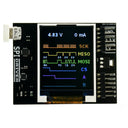SPIDriver Core
by Excamera Labs

SPIDriver is an easy-to-use tool for controlling SPI devices. It works with Windows, Mac, and Linux, and has a built-in color screen that shows a live logic-analyzer display of all SPI traffic.
It uses a standard FTDI USB serial chip to talk to the PC, so no special drivers need to be installed. The board includes 3.3 and 5 V supplies with voltage and current monitoring.
If you use SPI devices - LCD panels, flash memory, sensors, LEDs - you’ll know that the most frequently asked question is "what’s it doing now?" SPIDriver shows you what’s happening on the SPI bus in real time, so no more guessing about the bus state. It’s designed to make talking to SPI hardware a smooth, intuitive process. That’s good whether you’re a hardware debug wizard or are introducing a class to SPI for the first time.
The current and voltage monitoring let you catch electrical problems early. The included color coded wires make hookup a cinch; no pinout diagram required. It includes 3.3 and 5 V supplies for your device, plus a high-side current meter.
SPIDriver comes with free (as in freedom) software to control it from:
- a GUI
- the command-line
- C and C++ using a single source file
- Python 2 and 3, using a module
Who Needs It and Why?
If you use SPI hardware, you need SPIDriver. You can directly control LEDs and LCD displays without having to go near a microcontroller. If you need to examine, backup, or clone an SPI flash, SPIDriver is the ideal tool. It can read, backup, and restore standard SPI flash chips in-circuit, and is supported by the popular flashrom tool. If you work with SPI sensors, you can debug, test and calibrate them from your desktop using the programming tools you use every day.
Want to get a picture on a graphic display?
Graphic displays can be a pain, so it can feel like a real achievement getting them to display an image. SPIDriver is a natural fit for driving, testing, and evaluating different displays. Of course, SPIDriver also works perfectly with the Gameduino series of graphic touch screens.

Want to program SPI flash?
SPI flash is very common, and by using a test clip, SPIDriver makes it convenient to read and write SPI flash in-circuit. Just attach the clip and you can backup and restore flash contents directly. Atmel’s microcontrollers in-circuit programming use standard SPI pins, so a short script is all it takes to read or write an Atmel’s flash.

Light up LED strips from your desktop
SPI LED strips are also simple to hook up to SPIDriver, and being able to control them directly makes them much more fun! It’s fast enough to smoothly animate long strips and achieve POV effects. Short strips can be powered directly by the SPIDriver’s beefy 470 mA built-in supply.

Features
- live display shows you exactly what it's doing all the time
- sustained SPI transfers at 500 Kbps
- USB line voltage monitor to detect supply problems, to 0.01 V
- target device high-side current measurement, to 5 mA
- two auxiliary output signals, A and B
- dedicated power out lines. two each of GND, 3.3 V and 5 V
- all signals color coded to match jumper colors
- all signals are 3.3 V, and are 5 V tolerant
- uses an FTDI USB serial adapter, and Silicon Labs automotive-grade EFM8 controller
- also reports uptime, temperature, and running CRC of all traffic
- all sensors and signals controlled using a simple serial protocol
- GUI, command-line, C/C++, and Python 2/3 host software provided for Windows, Mac, and Linux
Specifications
- maximum power out current: up to 470 mA
- signal current: up to 10 mA
- device current: up to 25 mA
- dimensions: 61 mm x 49 mm x 6 mm
- interface: USB 2.0, micro USB connector
Resources
- All setup and technical information about SPIDriver can be found in the User Guide.
- 用户指南 Chinese User Guide PDF.
- For Windows, download the latest installer here.
- For Mac, download the GUI here.
- For Linux, download the GUI here.
- The SPIDriver module is available on PyPI:
pip install spidriver
- All design files and firmware are in the SPIDriver open source repository.
We no longer stock this product
It's sad to say goodbye but sometimes we have to retire products to make way for new things.
You may still be able to buy this product directly from our friends at Excamera Labs - check out their website!
Shop with confidence – we've been serving the hobbyist electronics, Maker, and retro gaming communities since 2012.
- Satisfaction or refund guarantee
- Worldwide shipping via mail or courier
- 57,000+ customer reviews
- Secure website and payments